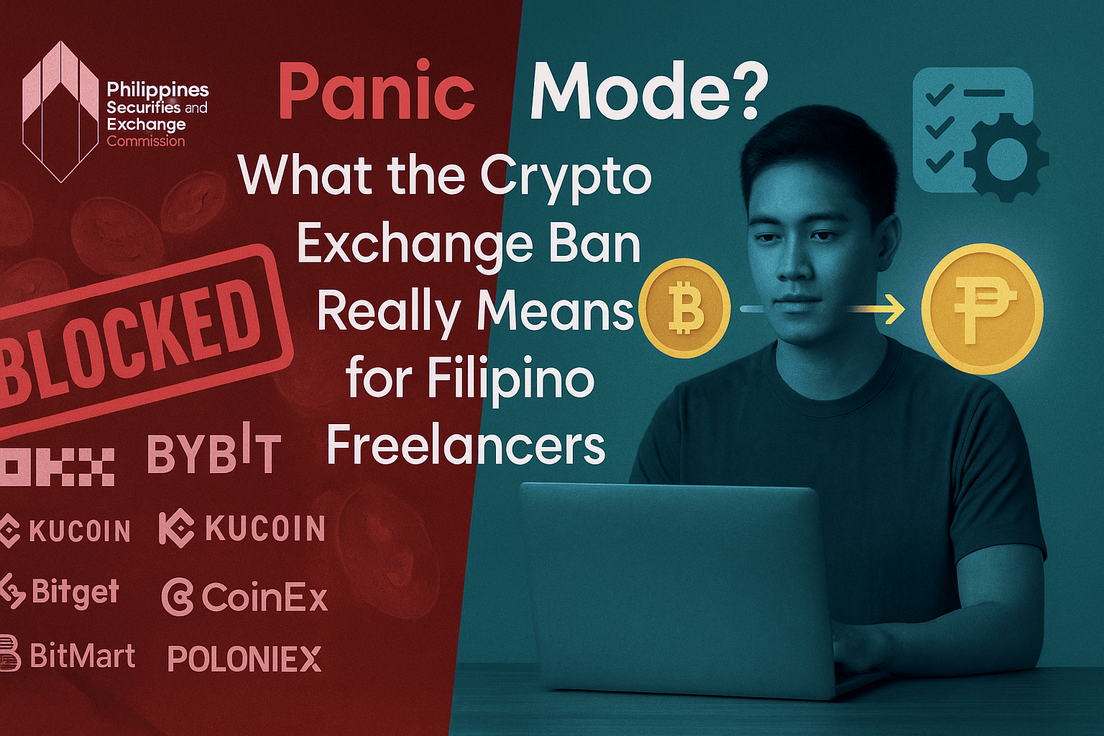If you’re a freelancer who gets paid in crypto, you probably felt a little jolt of panic this week. The news is everywhere: the Securities and Exchange Commission (SEC) in the Philippines has started blocking access to unregistered crypto exchanges. For many of us, that means many of the platforms we rely on, like OKX, Bybit, Kucoin, and others.
I get it. For years, getting paid in USDT or other cryptocurrencies has been a fast and cheap way to receive our earnings from foreign clients. It often felt easier than dealing with slow bank transfers and high fees. So when the government steps in and blocks the main platforms we use, the first question that pops into our heads is, “Oh no, how will I get my salary now?”
I’ve spent the last few days reading up on this, and I want to break down what’s actually happening, why it’s happening, and what we, as Filipino freelancers, need to do to protect our hard-earned money. Don’t panic. We have options.
First, Why is This Happening?
Before we talk about the solution, it’s important to understand the problem from the government’s point of view. The SEC says their main goal is to protect us, the users. Exchanges like OKX, Bybit, and many others are not registered as corporations in the Philippines. This means they don’t have the licenses to operate here, and they don’t follow the local rules set for financial companies. In the government’s eyes, if something goes wrong, like if the exchange suddenly disappears with everyone’s money, there is no way for them to help us or to hold the company accountable. They are trying to prevent a big disaster by forcing everyone to use platforms that are officially registered and regulated here in our country.
How This Directly Affects Your Crypto Salary
Okay, so let’s get to the important part. How does this affect you when your client sends your pay? The biggest change is that accessing the websites and apps of these blocked exchanges will become very difficult. You might wake up one day and find that you simply can’t log in to your account through your normal internet connection.
This creates a few problems. If your client sends money directly to your wallet on one of these exchanges, you might have trouble accessing it to sell or transfer. Using the Peer-to-Peer (P2P) market on these platforms also becomes riskier. While P2P feels like a direct transaction, it still operates within the app that is being blocked. It’s a gray area, and it’s not a stable, long term solution for your main source of income.
What You Should Do Now: A 3-Step Plan
This is not the end of the world. It just means we need to be smarter and more strategic about how we get paid. Here’s a simple plan I’m following myself.
1. Talk to Your Clients Immediately. This is the most important step. Be proactive. Send your clients a message and explain the situation calmly and professionally. You can say something like, “Hi [Client Name], just a heads up, our government is making some regulatory changes that will make it difficult for me to receive payments through [Exchange Name] soon. To make sure there are no delays with my salary, I’d like to transition to a different payment method. I’ve found that Wise (formerly TransferWise) is a great option.”
2. Prioritize Stable, Non-Crypto Methods. For the sake of stability, your best bet right now is to move away from crypto for your main salary. I cannot recommend Wise enough. The fees are low, the exchange rates are excellent, and the money goes directly to your local bank account or e-wallet like GCash. It’s reliable, professional, and not affected by these new regulations.
3. If You Must Use Crypto, Use Registered Platforms as Your “Off-Ramp.” If your client insists on paying in crypto, you need a safe way to convert it to pesos. This is where you should use the platforms that are officially registered in the Philippines, like Coins.ph or PDAX. You can have your client send the crypto to your personal wallet (like MetaMask or Trust Wallet), and then you can transfer it from your personal wallet to a registered local exchange to sell it for pesos. This adds an extra step, but it’s the safer, more compliant way to do it now.
Change can be scary, especially when it involves our income. But this is also an opportunity for us to build a more stable and professional freelance business. By moving to more reliable payment systems, we actually reduce our risk in the long run. Our industry is always changing, and our ability to adapt is what makes us successful. We’ve got this.
